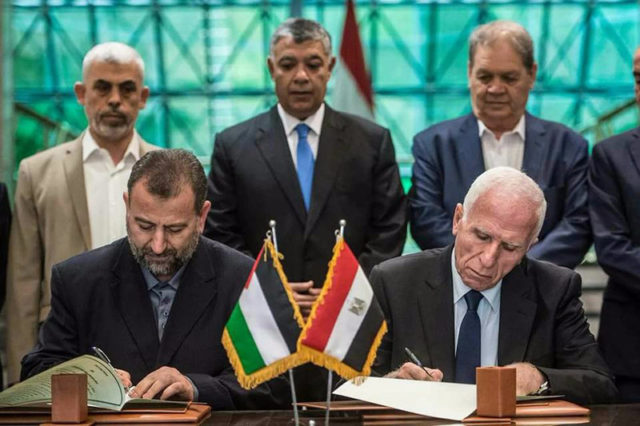
After weeks of Egyptian-sponsored pre-talks, and a very short “cabinet meeting” in Gaza, “formal reconciliation talks” are now being held between Hamas and the Palestinian Authority (P.A. or Fatah) in Cairo under the direct auspices of President Abdel Fattah el-Sisi.
For some Middle East-watchers, the talks are a form of progress. There are presently three functional governments between the Jordan River and the Mediterranean Sea, and this is about getting rid of one of them. Progress here is that Israel is not the government they’re talking about getting rid of. Yet. This is about whether Hamas or Fatah will lead the Palestinians – whether to peace with Israel or to war with Israel is less important for them right now than simply who between them is top dog.
The factions are “optimistic,” according to Palestinian sources in Cairo. To the extent they are, Israel and the West should be worried, because what they agree on is that Jewish sovereignty is illegitimate. What they don’t agree on is who gets the bigger army. Scylla here is an 83-year-old despotic kleptocrat whose administration has impoverished and radicalized the people of the West Bank while begging protection from Israel against Charybdis – a terror organization that has impoverished and radicalized the people of Gaza.
Most of the world – the United States included – simply assumes that the legitimate party is Fatah. Hamas assumes no such thing. In the last Palestinian election (2006 if you’re counting), Hamas won 76 of the 132 legislative seats; Fatah won 43. Hamas should have been allowed to form the cabinet, but the legislature was never seated – in part because Israel and the United States didn’t want Hamas in the government any more than Fatah did. But it was, in fact, the result of the last thing that passed for a general election. The short, brutal civil war came in 2007. Mahmoud Abbas’s term as president expired in 2009.
Hamas claims that it will turn the civil administration over to Fatah but insists that it will hold on to its army (25,000 fighters of the Izz al-Din al-Qassam brigades) in what it calls a “Lebanon solution,” a private militia outside the government. Hamas leader Ismayil Haniyeh told Egyptian television, “There are two groups of weapons. There are the weapons of the government, the police and security services[.] … And there are the weapons of resistance. Regarding the weapons of the resistance, as long as there is a Zionist occupation on Palestinian land, it is the right of the Palestinian people to possess weapons and resist the occupation in all of forms of resistance.”
Other than the threat of a military victory, Hamas holds few actual cards. Egypt keeps the Rafah border crossing in Gaza mostly closed as a means of keeping Hamas from joining forces with ISIS and other jihadist elements in the Sinai. Qatar has reduced its funding, and Iran has not made up the difference.
The P.A., on the other hand, is the recipient of international largesse – European, American, NGOs, etc. It is supposed to use the money for all the Palestinians, including paying Gaza government officials and workers, paying utility bills to Israel, paying teachers, etc. But it uses it instead to assert authority.
After the 2007 war, 70,000 P.A. employees in the Gaza Strip lost their jobs, but they remained on the P.A. payroll; many haven’t been to work since. Recently, the P.A. cut the salaries of its own people in Gaza by 30 percent, hoping they would pressure Hamas. In April, the P.A. stopped paying for Gaza’s electricity, resulting in shortages over the summer that simply made miserable people more miserable.
If Abbas wanted to strong-arm Hamas, he failed. Despite its apparently superior position, the electricity is back on, and the P.A. won no decisive battle against Hamas. It will now try to win in negotiations what it couldn’t manipulate on the ground.
But while they try, keep in mind that a victory for Scylla is not a victory. The 70-nation Paris Peace Conference in January included in its final communiqué a scathing indictment of the P.A., noting that after 24 years of self-rule, it lacked “the infrastructure for a viable Palestinian economy” and had no capacity for “service delivery” and inadequate “civil society fora.” To birth “Palestine” under the circumstances would be to birth South Sudan – a failed state for its own people and a chaotic one for the rest of us.

